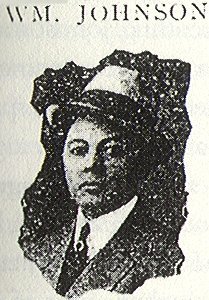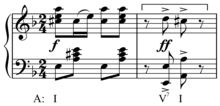
William Manuel "Bill" Johnson was an American jazz musician who played banjo and double bass; he is considered the father of the "slap" style of double bass playing.

Edward "Kid" Ory was an American jazz composer, trombonist and bandleader. One of the early users of the glissando technique, he helped establish it as a central element of New Orleans jazz.

OKeh Records is an American record label founded by the Otto Heinemann Phonograph Corporation, a phonograph supplier established in 1916, which branched out into phonograph records in 1918. The name was spelled "OkeH" from the initials of Otto K. E. Heinemann but later changed to "OKeh". Since 1965, OKeh was a subsidiary of Epic Records, a subsidiary of Sony Music. Today, OKeh is a jazz imprint, distributed by Sony Masterworks.
"Potato Head Blues" is a Louis Armstrong composition regarded as one of his finest recordings. It was made by Louis Armstrong and his Hot Seven for Okeh Records in Chicago, Illinois on May 10, 1927. It was recorded during a remarkably productive week in which Armstrong's usual Hot Five was temporarily expanded to seven players by the addition of tuba and drums. Some scholars have suggested that a key melodic figure in "Potato Head Blues" was picked up by Hoagy Carmichael for "Stardust." Its musical composition entered the public domain on January 1, 2023.
The Hot Five was Louis Armstrong's first jazz recording band led under his own name.
Louis Armstrong and his Hot Seven was a jazz studio group organized to make a series of recordings for Okeh Records in Chicago, Illinois, in May 1927. Some of the personnel also recorded with Louis Armstrong and His Hot Five, including Johnny Dodds (clarinet), Lil Armstrong (piano), and Johnny St. Cyr. These musicians were augmented by Dodds's brother, Baby Dodds (drums), Pete Briggs (tuba), and John Thomas. Briggs and Thomas were at the time working with Armstrong's performing group, the Sunset Stompers.
"West End Blues" is a multi-strain twelve-bar blues composition by Joe "King" Oliver. It is most commonly performed as an instrumental, although it has lyrics added by Clarence Williams.
"Memories of You" is a popular song about nostalgia with lyrics written by Andy Razaf and music composed by Eubie Blake and published in 1930.
I'll Be Glad When You're Dead You Rascal You is a 1932 American pre-Code Fleischer Studios animated short film starring Betty Boop, and featuring Koko the Clown and Bimbo. The cartoon features music by and a special guest appearance from jazz trumpeter Louis Armstrong and his Orchestra playing "You Rascal You". The title of the film comes from the song, written by Sam Theard in 1931.

"If I Could Be with You (One Hour Tonight)" is a popular song. The music was written by James P. Johnson, the lyrics by Henry Creamer. The song was published in 1926 and first recorded by Clarence Williams' Blue Five with vocalist Eva Taylor in 1927. It was popularized by the 1930 recording by McKinney's Cotton Pickers, who used it as their theme song and by Louis Armstrong's record for Okeh Records (catalogue No.41448), both of which featured in the charts of 1930. Armstrong's recording of "If I Could Be with You" is defined by his sparse vocal style and ornamental virtuosic trumpet-playing.
Reuben "River" Reeves was an American jazz trumpeter and bandleader.

"Heebie Jeebies" is a composition written by Boyd Atkins which achieved fame when it was recorded by Louis Armstrong in 1926. Armstrong also performed "Heebie Jeebies" as a number at the Vendome Theatre. The recording on Okeh Records by Louis Armstrong and his Hot Five includes a famous example of scat singing by Armstrong. After the success of the recording, an accompanying dance was choreographed and advertised by Okeh.
"(What Did I Do to Be So) Black and Blue" is a 1929 jazz standard composed by Fats Waller with lyrics by Harry Brooks and Andy Razaf. It was introduced in the Broadway musical Hot Chocolates (1929) by Edith Wilson. In the show, Wilson originally sang the song from a bed with white sheets, but the bed was removed after the first show due to the judgement that it was too suggestive. The show also included Waller's hit compositions "Ain't Misbehavin'" and "Honeysuckle Rose".
"Big Butter and Egg Man" is a 1926 jazz song written by Percy Venable. Venable was a record producer at the Sunset Cafe and wrote the song for Louis Armstrong and singer May Alix. The song is often played by Dixieland bands, and is considered a jazz standard.
Liza Mae "May" Alix was an American cabaret and jazz vocalist.
Joe "Fox" Smith(Joseph Emory Smith; June 28, 1902 – December 2, 1937) was an American jazz trumpeter.
"Dippermouth Blues" is a song first recorded by King Oliver's Creole Jazz Band for Gennett Records in April 1923 and for Okeh Records in June of that same year. It is most often attributed to Joe "King" Oliver, though some have argued that Louis Armstrong was in fact the composer. This is partly because "Dippermouth", in the song's title, was a nickname of Armstrong's. Also, the phonograph recordings from 1922 gave credit to Armstrong and Oliver jointly. The song is a strong example of the influence of the blues on early jazz. There is a twelve-bar blues harmonic progression, with frequent bent notes and slides into notes.
Ollie Powers was an American jazz drummer and vocalist.
Hot Chocolates is a musical revue with music by Fats Waller and Harry Brooks and book by Andy Razaf. It was originally titled Tan Town Topics in hopes it would be picked up by Broadway. Performed at the Hudson Theater in New York City, it was directed by Leonard Harper and ran for 219 performances from June 20, 1929, to December 14, 1929. It is also referred to as Connie's Hot Chocolates. It was staged, directed and produced by Leonard Harper. While the revue featured music and singing, including the subsequent hit "Aint Misbehavin'," it was praised for the cast's dancing, including its male and female chorus lines.
Leroy Broomfield (1902–1971) was a dancer in the United States and appeared on stage and in films. He was also a producer, choreographer and taught dance.








